Sunarman Sukamtois the initiator of a network of individuals and organisations with similar interests in disability issue. He talks about disability issue during the discussion and coordination of the Solo Vision for Inclusion Network on Wednesday (18/6), and suggest that it is not that interesting of an issue for a number of people compared to other issues.
The other issue is that Disability-Aware Communities act individually and without developing a common network for policy advocacy. Such organisations and NGOs act on the basis of their own pragmatic and partial interests driven by (political) power, hence the critical need to establish networks in order to actively advance the disability movement.
The State is not yet fully engaged in promoting inclusion as evident in budget cut in the name of efficiency that has effects on public service provision - efficiency aimed at paying for government initiated free nutritious lunch, people’s schools, and position/job “overdose”.
In his latest presentation, Sunarman says that the problem in national disability action is that it is difficult to bring ideas into reality because of the slow pace of the mid-term development plan implementation which is effective more or less in two years in order to push the action’s mainstreaming as a matter of urgent priority. Sunarman responds with regards to the position of people with disability, which he says is around 50:50 meaning that it is between optimistic and pessimistic that there Solo Vision for Inclusion Network would lead to action to push for Solo policy for inclusion and to design strategies such as regular meetings, advocacy, networking, and critical analysis of city mid-term development plan, as well as education through the media.
As member of Solo Vision for Inclusion Network, Adi C. Kristiyanto responds that promoting policies and services for people with disability is extremely important. We need to see the opportunities within the 50:50 position as discussed by Sunarman. We also need to look at how the needs of people with disability is not only addressed in fulfilling requirements in project proposal, but must be based on actual/real need of people with disability. Adi explains that there is key stakeholder that still holds the view that it is enough, as a matter of onligation, for the government to provide financial assistance to people with disability. This needs further scrutiny.
Adi C. Kristiyanto adds that volunteers and young people need to attend special classes on sensibility and capacity to learn disability sensitivity. Joint learning is critical in order to gain awareness and to not fall into the trap of thinking that the activity is mere project, hence the need to establish a curricula and minimum service standard (SPM) on disability sensitivity.
As coordinator of Solo Vision for Inclusion Network and disability activist, Pamitkasih also expresses that actions by the network have made its mark with increasing need amongst schools and universities for disability sensitivity and talks about disability sensitivity to be inserted in curricula. This is important in order to address the concerns of people with disability.
People with disability and their companion also share such concerns (re. ignorance of disability sensitivity. As member of the Solo Inclusive Vision network, Astuti expressed such concerns by telling the experience of people with disability who found it difficult to access the show. This is not the only issue, as the Inclusive Economic Event, which is supposed to be inclusive, also proves difficult to access by people with disability. Small and Medium business exhibition happened at the Palace. There was already objection during a launch of Local Disability Commission and corollary advocacy to the Palace, yet it was sad to see the the so-called City of Inclusion in Solo is not yet inclusive. Astuti also talks about her experience with activities at Vastenburg Fort, where the organiser set up tents on guiding blocks footpath, and she told the vendor, and that it was necessary to give direct warning and to demand the rights of people with disability to be respected.
Sunarman also responds that people need to ensure their rights are respected and that there is a need to provide training on disability sensitivity to vendors in order to encourage them to change their work practices.
Pamitkasih explains the need to invite vendors to learn disability sensitivity because vendors see the need and are open to learn. Adi C. Kristiyanto responds that it is not just vendors, but government offices also need to learn about the importance of disability sensitivity.
Solo Inclusion Vision Network (Jaringan Visi Solo Inklusi) does not only address disability but will also act through face-to-face and online meetings, hearing with the government to promote the rights of people with disability, as well as campaign via social media to promote inclusion in Solo. (Renny Talitha)












